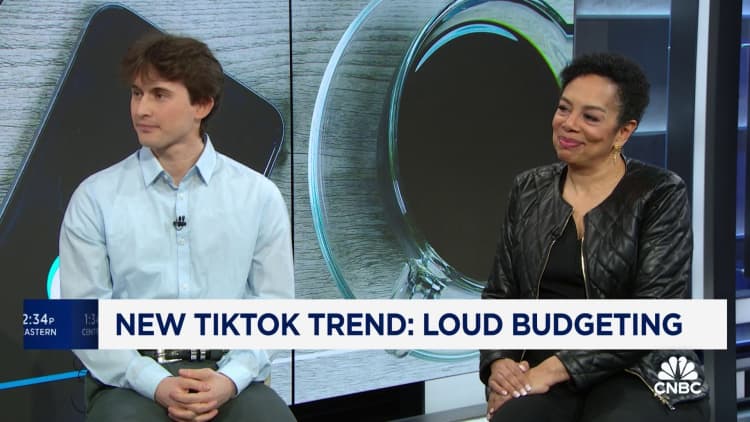
Peshkova | Getty Images
From cash stuffing to loud budgeting, TikTok is chock-full of ways to build wealth — and more people are taking notice.
Financial TikTok, also known as #FinTok, is now one of the most popular sources for financial information, tips and advice, particularly among Generation Z.
With less access to professional advisors and a preference for obtaining information online, Gen Zers are more likely than any other generation to engage with finfluencer content on TikTok, YouTube and Instagram, according to a report by the CFA Institute.
More from Personal Finance:
‘Loud budgeting’ is having a moment
Nearly half of young adults have ‘money dysmorphia’
Here’s what’s wrong with the ‘100 envelope’ method
In fact, Gen Zers are nearly five times more likely than adults in their 40s or older to say they get financial advice — including stock tips — from social media, according to a separate CreditCards.com report.
But even the best advice can backfire. Here is what you should know before jumping on the latest money-saving trend.
‘Loud budgeting’ can ‘lead to frustration’
“Loud budgeting,” which encourages consumers to take control of their finances and vocalize making money-conscious choices over other activities, such as going out with friends, is one of the top trends of the year.
While scaling back on discretionary spending is key to better budgeting, limiting your social interactions also comes at a cost, according to Paul Hoffman, a data analyst at BestBrokers, who wrote a recent report on harmful FinTok trends. Before passing on a movie or dinner date, consider that turning down those invitations can “lead to frustration and emotional distress,” he said.

There may be better ways to cut back, Hoffman advised, without sacrificing time with the people close to you. “It’s important to find a balance between saving and engaging in enjoyable activities,” he said.
‘100 envelope’ trick creates a missed opportunity
More young adults are also trying the “100 envelope” method, which suggests saving a dollar more each day for 100 days. On the first day, you’ll set aside $1, then $2 the next day and so on, so by the end of the 100-day period, you will have more than $5,000 saved.
This seems like a good idea “with a relatively low ceiling,” according to Matt Schulz, chief credit analyst at LendingTree. However, “if there’s ever been a time when you shouldn’t stick your money in a binder, it’s today when you can get 4% to 5% or more back in these high-yield savings accounts,” he said.
After a series of interest rate hikes from the Federal Reserve, some top-yielding online savings account rates are now paying even more than 5%, according to Bankrate.com — well above the rate of inflation.
In this case, if you had $5,000 in a high-yield savings account earning 5%, you would have made roughly $250 in interest in a year.
‘Cash stuffing’ also forfeits interest
Another envelope method, called “cash stuffing,” advocates for dividing up your spending money into envelopes representing your monthly expenses, such as groceries and gas, to stay on budget and out of debt.
When the cash in one envelope is spent, you’re either done spending in that category for that month or you need to borrow from another envelope.
Yet, stashing cash not only forfeits the best returns in decades, but it also leaves you vulnerable to theft and could forgo the protections that come with consumer banking.
Whether and to what extent you are covered in case of a burglary may depend on your home insurance policy, whereas banks are covered by the FDIC, which insures your money for up to $250,000 per depositor, per account ownership category.

‘No spend’ challenges can be tough to sustain
Alternatively, the “no-spend” challenge promotes eliminating all nonessential purchases altogether for a week, a “no buy month” or even a full year, and putting the money that would otherwise go to dinners out or new clothes toward a long-term financial goal.
“The gamification can be kind of fun,” Ted Rossman, senior industry analyst at Bankrate, recently told CNBC. But like any other quick fix, these challenges could be hard to sustain over time.
Rather than hop on the latest extreme fad, “it comes back to setting a budget and setting expectations,” he said.
Ultimately, there is no short cut to practicing good money habits, most experts say.
“No hack can teach you self-control, mindful spending or how to keep your balance low,” Hoffman added.
EMEA Tribune is not involved in this news article, it is taken from our partners and or from the News Agencies. Copyright and Credit go to the News Agencies, email news@emeatribune.com Follow our WhatsApp verified Channel









